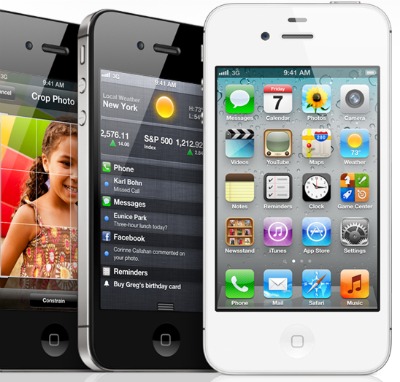
Even though the iPhone 4S runs the same dual-core A5 CPU as the iPad 2, Apple has apparently reduced the chip’s speed from 1 gigahertz to around 800MHz, reports Anandtech. But that doesn’t stop the iPhone 4S from blazing past all other phones — many of which have CPUs well over 1GHz — in benchmark tests.
[aditude-amp id="flyingcarpet" targeting='{"env":"staging","page_type":"article","post_id":340221,"post_type":"story","post_chan":"none","tags":null,"ai":false,"category":"none","all_categories":"business,mobile,","session":"A"}']In the SunSpider Javascript benchmark, the iPhone 4S is almost twice as fast as the iPhone 4, achieving a score of 2222ms vs 3921ms (lower is better). It’s only bested by the Samsung Galaxy Tab 8.9. The iPhone 4S trounces all others in the Rightware BrowserMark test, achieving a score of 89,567, while the Samsung Galaxy S II only hits 55,144. Compared to the iPhone 4, the Geekbench test found that the iPhone 4S is just about twice as fast.
Just as it did with the iPhone 4, which runs a slower A4 processor than the original iPad, Apple likely reduced the CPU’s speed to conserve battery life.
AI Weekly
The must-read newsletter for AI and Big Data industry written by Khari Johnson, Kyle Wiggers, and Seth Colaner.
Included with VentureBeat Insider and VentureBeat VIP memberships.
And as Anandtech writes, there are plenty of other benefits:
A lower clock not only means higher yields from the factory, but likely a lower operating voltage as well. Dropping a CPU’s core voltage, yields a greater-than-linear decrease in power consumption, making the marginal loss in clock speed a good choice. At a lower operating frequency than its Android competitors, Apple does have to exploit its strengths in software to avoid any tangible performance penalties. Apple has traditionally done this very well in the past, so I don’t expect the loss of frequency to be a huge deal to the few who do cross-shop iOS and Android.
When it comes to gaming, the iPhone 4S is no slouch either, achieving FPS speeds twice as fast as Samsung’s Galaxy S II.
Overall, while the iPhone 4S may appear to be just a slight upgrade over the iPhone 4, its new A5 chip makes it a different beast entirely.
VentureBeat's mission is to be a digital town square for technical decision-makers to gain knowledge about transformative enterprise technology and transact. Learn More
